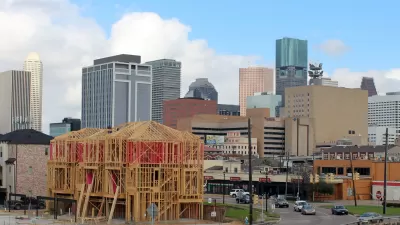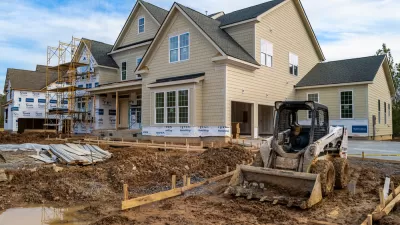A conversation with an architect yields insight into how Houston's pride in the lack of traditional land use regulation mechanisms has created the city as it exists today.

The Rice Design Alliance recently awarded its Spotlight Prize, recognizing up-and-coming architects, to the firm Oualalou + Choi, located in Paris and Casablanca. To commemorate the award, the Houston Chronicle excerpted an interview between Raj Mankad, of the Rice Design Alliance, interviewed Tarik Oualalou. The interview was originally published by the Houston-based architecture and design magazine Cite.
A few of the key excerpts from the interview, in which Mankad and Oualalou examine the city's land use regimes for insight into the city's built form. The interview, especially the portion excerpted in the Houston Chronicle, offers interesting opinions on the effects of planning and land use in this uniquely governed city, all from an architect's perspective:
- "You see spurts of building in short periods of time. So it's very dated. You see a lot of things in the late '70s, and then not in the '80s, a lot of things in the early '90s, and then not. These spurts of construction in short periods of time give it a very dated figure, almost like it's frozen in time….. It's not a city that builds over time. It just builds in moments. It creates a weird "stroboscopic" feel."
- "If there's no counter power, if there's no state, if there's no city, if there's no municipal system, if there's no public desire, organized public desire of sorts — whether it's community or elected or whatever it is — then the developer has no counter power."
FULL STORY: “Our responsibility as architects is to invent the form of public-ness:” An Interview of Tarik Oualalou

Alabama: Trump Terminates Settlements for Black Communities Harmed By Raw Sewage
Trump deemed the landmark civil rights agreement “illegal DEI and environmental justice policy.”

Study: Maui’s Plan to Convert Vacation Rentals to Long-Term Housing Could Cause Nearly $1 Billion Economic Loss
The plan would reduce visitor accommodation by 25% resulting in 1,900 jobs lost.

Planetizen Federal Action Tracker
A weekly monitor of how Trump’s orders and actions are impacting planners and planning in America.

Waymo Gets Permission to Map SF’s Market Street
If allowed to operate on the traffic-restricted street, Waymo’s autonomous taxis would have a leg up over ride-hailing competitors — and counter the city’s efforts to grow bike and pedestrian on the thoroughfare.

Parklet Symposium Highlights the Success of Shared Spaces
Parklets got a boost during the Covid-19 pandemic, when the concept was translated to outdoor dining programs that offered restaurants a lifeline during the shutdown.

Federal Homelessness Agency Places Entire Staff on Leave
The U.S. Interagency Council on Homelessness is the only federal agency dedicated to preventing and ending homelessness.
Urban Design for Planners 1: Software Tools
This six-course series explores essential urban design concepts using open source software and equips planners with the tools they need to participate fully in the urban design process.
Planning for Universal Design
Learn the tools for implementing Universal Design in planning regulations.
Caltrans
Smith Gee Studio
Institute for Housing and Urban Development Studies (IHS)
City of Grandview
Harvard GSD Executive Education
Toledo-Lucas County Plan Commissions
Salt Lake City
NYU Wagner Graduate School of Public Service





























